Middle-aged people will be able to get regular health checks on the NHS app rather than having to book an appointment with their GP from later this year.
They will be asked questions about their lifestyle, such as alcohol intake and exercise, and prompted to input measurements including height, weight, blood-pressure reading and cholesterol levels, some of which can be done at pharmacies.
The results will show if they are at risk of heart disease, stroke, type 2 diabetes or kidney disease and outline steps they can take to improve their health.
The digital assessment is for people aged between 40 and 74, who are currently sent letters from their GP offering them an in-person consultation every five years.
NHS leaders want them to be able to manage their own health, leaving appointments free for those who really need them.
“What we’re seeing now is the NHS communicating and engaging with patients in a way that they want to happen,” Joe Harrison, national director for the app at NHS England, said.
He said that a post-pandemic decline in use of the app had been reversed: user numbers had more than doubled in the past 12 months to more than 34 million. Some 1.2 million people log on daily.
Last month an average of 3.7 million prescriptions were ordered via the app, up 44 per cent on the year before. More than six million hospital appointments were also managed through it, compared with 2.2 million in the same month last year.
As well as getting health checks in middle age, later this year app users will be able to book vaccinations and sign up for disease-screening programmes. This will save time for GPs and help the NHS to identify patients most at risk so the health service can intervene earlier.
“We know that if you book an appointment through the NHS app you’re up to 50 per cent more likely to turn up than if you get a letter through the post,” Harrison said. “Having all the screening and vaccination programmes through the NHS app allows you to be able to book your appointment at a place that’s convenient for you. We know that the health impact of that will be really significant.”
The app is connected to 85 per cent of GP practices and 116 out of 125 acute hospital trusts. The government has promised another £3.4 billion to improve technology and efficiency in the NHS next year.
Joe Harrison, the national director for the NHS app, believes technology will improve life for patients
SUNDAY TIMES PHOTOGRAPHER JACK HILL
Harrison wants the app to offer personal health and wellness advice as well as services for patients to manage their care such as booking appointments and checking test results.
“There is a genuine interest from the population in their medical records, in their test results and how they manage their health,” he said.
Harrison is also THE chief executive of Milton Keynes University Hospital and has launched a two-year trial in partnership with the local council and Apple in which patients with type 2 diabetes are paid in vouchers worth up to £365 a year if they meet activity goals set by the app on their phone.
Harrison said the city had 17,500 patients with the disease, which can lead to complications that raise the risk of amputation. There are more than 180 diabetes-related amputations every week in the NHS.
“From a macroeconomic perspective, if we stop a single amputation, it pays for the programme in its entirety because of the subsequent impact on that individual, their ability to work, claim disability allowance and loss to the economy,” he said.
If the trial works, it could be introduced across the country. “We need to show that it works but is there then the opportunity to scale that in whatever form, using that technology, to improve the lives of diabetic patients across the country?” he said.
“I think the future of the NHS is both to continue to fix people but to also invest upstream to keep people healthy. We have not had the capacity or in many areas the capability to do both before.”
Corrine Wykes, 70, joined the trial in January and is expecting a voucher for £85 after successfully completing her 30 minutes of walking every day.
Wykes, a former biomedical scientist, had type 2 diabetes diagnosed in her forties and says she is already feeling the benefit.
She also supports the idea of the NHS app as a tool to manage health. “I use the NHS app for checking my results and for GP appointments,” she said. “I am on a waiting list for cataract surgery and so I check it for updates quite a lot.”
Wykes is not alone: the single biggest group using the NHS app is the over-65s.
“We have the opportunity to fundamentally improve the NHS model of care through technology. There’s no question about that,” Harrison said. “The NHS app will be the front door to the NHS. It is not going to go away, it is only going to grow.”

Sarah Carter is a health and wellness expert residing in the UK. With a background in healthcare, she offers evidence-based advice on fitness, nutrition, and mental well-being, promoting healthier living for readers.








